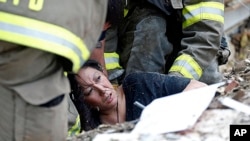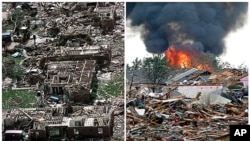HOUSTON —
A tornado with 320 kilometer per hour winds has killed at least 51 people and caused massive destruction in the central U.S. state of Oklahoma, destroying two schools and entire neighborhoods.
The Oklahoma Medical Examiner's Office said the death toll was expected to rise as rescue workers move deeper into the hardest-hit areas.
The 1.6 kilometer-wide tornado hit Monday afternoon and destroyed large swaths of Moore, an Oklahoma City suburb, injuring dozens of people, sending debris flying and setting buildings on fire.
Rescue workers have pulled several children alive out of the rubble of the schools.
Oklahoma Governor Mary Fallin deployed 80 National Guard members to assist with search-and-rescue operations.
Fallin also spoke with President Barack Obama, who asked the Federal Emergency Management Agency to provide any assistance she needs.
The severe weather outbreak was expected to spread across other parts of the Plains and the Midwest. An earlier tornado killed two people in Oklahoma Sunday.
The National Weather Service placed parts of five storm-battered states - Oklahoma, Kansas, Missouri, Arkansas and Texas - under a tornado watch, meaning conditions are favorable for tornadoes to develop.
The same suburb of Oklahoma City was hit hard by a tornado in 1999. That storm had the highest winds ever recorded near the Earth's surface.
A tornado transformed the part of Moore directly in its path from a quiet middle class community into a field of debris. Rescue teams were digging through piles of wrecked wood, twisted metal and other rubble searching for victims who may have been trapped.
Rick Smith, a meteorologist at the National Weather Service Storm Prediction Center in Norman, Oklahoma, just south of Moore, says the danger has not yet passed.
"We are going to be dealing with this for several hours it looks like and then, hopefully, after today it will quiet down for a while," said Smith.
Smith says storms are common at this time of year in Oklahoma and nearby states, an area often called "Tornado Alley." He says the monster tornadoes are the result of humid air close to the ground and wind conditions both near the ground and high up in the atmosphere.
"We have had very strong winds aloft and at the surface that creates what we call wind shear, that makes the storms start to rotate, and then we have had upper level disturbance, a storm system in the upper levels of the atmosphere, that moved out across Oklahoma this afternoon and the storms went from nothing to intense, dangerous storms in less than an hour," he said.
No one can predict exactly where a tornado will come down within the wide area covered by a storm system, but Rick Smith says Storm Prediction Center forecasters do everything possible to warn people.
"We were in close contact with emergency school systems and everything and our forecast and our information indicated that this was going to be as bad or worse than yesterday and it looks like that has definitely been the case," he said.
Tornadoes on Sunday killed two people in communities south and east of Oklahoma City. On Monday, legislators in the state Capitol cancelled sessions and took shelter along with state government employees as the storm clouds passed over the city. A full assessment of death, injury and damage from these tornadoes is likely to take days and the threat of more tornadoes in the area is far from over.
The Oklahoma Medical Examiner's Office said the death toll was expected to rise as rescue workers move deeper into the hardest-hit areas.
Loading...
The 1.6 kilometer-wide tornado hit Monday afternoon and destroyed large swaths of Moore, an Oklahoma City suburb, injuring dozens of people, sending debris flying and setting buildings on fire.
Rescue workers have pulled several children alive out of the rubble of the schools.
Oklahoma Governor Mary Fallin deployed 80 National Guard members to assist with search-and-rescue operations.
Fallin also spoke with President Barack Obama, who asked the Federal Emergency Management Agency to provide any assistance she needs.
The severe weather outbreak was expected to spread across other parts of the Plains and the Midwest. An earlier tornado killed two people in Oklahoma Sunday.
The National Weather Service placed parts of five storm-battered states - Oklahoma, Kansas, Missouri, Arkansas and Texas - under a tornado watch, meaning conditions are favorable for tornadoes to develop.
The same suburb of Oklahoma City was hit hard by a tornado in 1999. That storm had the highest winds ever recorded near the Earth's surface.
A tornado transformed the part of Moore directly in its path from a quiet middle class community into a field of debris. Rescue teams were digging through piles of wrecked wood, twisted metal and other rubble searching for victims who may have been trapped.
Rick Smith, a meteorologist at the National Weather Service Storm Prediction Center in Norman, Oklahoma, just south of Moore, says the danger has not yet passed.
"We are going to be dealing with this for several hours it looks like and then, hopefully, after today it will quiet down for a while," said Smith.
How is a Major Disaster Declared in US?
How is a Major Disaster Declared in US?- A state's governor determines recovery is beyond the resources of state and local governments
- FEMA works with the state to assess damage
- Assessment looks at effect on people and businesses, number of people displaced, threat to public health, impact on infrastructure
- By declaring a major disaster, the federal government can supplement recovery efforts ad make funding available
- Assistance includes grants for temporary housing and low-cost loans
"We have had very strong winds aloft and at the surface that creates what we call wind shear, that makes the storms start to rotate, and then we have had upper level disturbance, a storm system in the upper levels of the atmosphere, that moved out across Oklahoma this afternoon and the storms went from nothing to intense, dangerous storms in less than an hour," he said.
No one can predict exactly where a tornado will come down within the wide area covered by a storm system, but Rick Smith says Storm Prediction Center forecasters do everything possible to warn people.
"We were in close contact with emergency school systems and everything and our forecast and our information indicated that this was going to be as bad or worse than yesterday and it looks like that has definitely been the case," he said.
Tornadoes on Sunday killed two people in communities south and east of Oklahoma City. On Monday, legislators in the state Capitol cancelled sessions and took shelter along with state government employees as the storm clouds passed over the city. A full assessment of death, injury and damage from these tornadoes is likely to take days and the threat of more tornadoes in the area is far from over.










